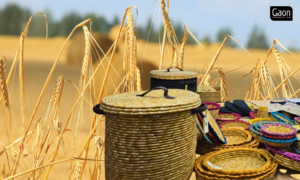Shivpuri, Madhya Pradesh
Phoolwati Lodhi of Pipal Kheda village is a happy lady, and a busy one. She, along with 12 other women from her village that falls in the Khaniyadhana block in Shivpuri district of Madhya Pradesh, are engaged in making cold pressed peanut oil.
“We own an acre of land besides which family members also work as daily wage labourers in order to make ends meet,” 35-year-old Phoolwati told Gaon Connection. While her family lived on the acre of land and the Rs 200 a day they earned as daily wages, things have changed for the better, she said.
It is all thanks to the peanuts cultivated in Karera, Shivpuri district, Madhya Pradesh. They are renowned for their taste and are often referred to as Karera ke kaju (cashews of Karera).
Also Read: Rural women put Panna’s amla on the murabba map of India
The Karera peanuts, also considered extremely nutritious, recently got a filip as cold pressed oil made from them was exported to Malaysia and the United States. The oil made by rural women such as Phoolwati Lodhi is in demand and recently, nearly 400 litres of oil from Pipal Kheda was exported.
“Twelve women from a self help group in Pipul Kheda are working at Anand Moongphali Tel Utpadan Samooh, giving them an extra source of income,” Pramod Srivastav, district manager, National Rural Livelihoods Mission (NRLM), Shivpuri, told Gaon Connection. “The Anand Moongphali Tel Utpadan Samooh provides employment to 65 people from the area including peanut farmers. Even the dregs of the peanuts, left over after extraction of oil, is used to generate additional income,” he said.
Also Read: Rural women in Uttar Pradesh spin a banana yarn and earn themselves economic independence
An augmented income
The women of Pipal Kheda who once depended on wages that they earned as labourers, are now making an added Rs 3,000 to Rs 4,000 a month more, making the cold pressed oil. The National Rural Livelihoods Mission of the Union ministry of rural development is working towards increasing their income.
Around 50 local peanut farmers in the area supply the Karera peanuts to the SHG. The women clean the peanuts, extract the oil and then pack it.

The peanut oil has brought a smile to the face of Siya Lodhi too. Like Phoolwati, she too struggled to make ends meet till she became involved in the oil-making enterprise. The 42-year-old barely managed with the yield from her acre of land and worked as a daily wage labourer too.
Phoolwati’s 22-year-old son Prasendra Lodhi helps the women run the cold-press to make the oil. “I am confident that the way the demand for oil is increasing, our income will increase too,” he told Gaon Connection. According to him, he makes up to Rs 5,000 a month at the cold-press.
In days gone by, the oil extraction would take place with the help of big crushers turned by bulls. The same kind of method is used now, only instead of bulls, the press is run by electricity.
“We got the cold-press from south India at a cost of nearly two lakh rupees. The women extract about forty litres of oil from it every day,” Srivastav explained. The quantity will be increased, the district manager said.
Also Read: Water hyacinth gets a makeover as yoga mats
Finding a foreign market
The oil from Anand Moongphali Tel Utpadan Samooh sells at Rs 240 for a one litre pack and Rs 1,180 for a five-litre pack. The group earns anything up to Rs 40,000 a month from the oil.
“About three to four thousand rupees are credited to each woman each month and efforts are on to increase the amount to eight thousand rupees per woman,” Srivastav said.
“Ninety litres of oil have been exported to the United States and forty five litres to Malaysia with the help of a private company, Ma Reva Vaidik Food Research and Producer Company, based in Bhopal,” Srivastav informed.
Also Read: In a first, Chhattisgarh’s women self-help groups facilitate record collection of sal seeds
“We have also sent samples of the oil to Germany and Dubai. We may also get orders from there. There is a good demand for the oil that the rural women are making,” Varun Singh, co-founder of Ma Reva Vaidik Food Research and Producer Company, told Gaon Connection.
Peanut cultivation in India
After China, India is the largest cultivator of peanuts in the world. In the country, it is Gujarat that leads the production. The other states that grow peanuts in significant amounts are Madhya Pradesh, Rajasthan, Andhra Pradesh, Tamil Nadu, Karnataka, Maharashtra and West Bengal.
Peanuts are cultivated in both the rabi (winter crop) and kharif (monsoon crop) seasons. According to the Union ministry of agriculture and farmers welfare, in 2019-20, the production of peanuts stood at approximately 9.95 million tonnes that increased to 10.12 million tonnes in 2020-21.
Also Read: Self help groups in Uttar Pradesh learn to use the mobile phone as marketing tool
In 2020-21, India exported about 638,000 tonnes of peanuts earning Rs 53.81 billion in foreign exchange.
India exports peanuts mainly to Indonesia, Philippines, Vietnam, Thailand, Malaysia, Russia, Ukraine, China, Nepal and the United Arab Emirates. The Agriculture and Processed food Production Export Development Authority (APEDA) is going all out to give peanut exports a boost.
Read the story in Hindi.


















